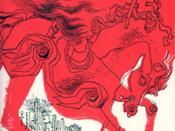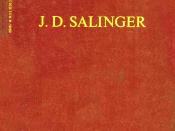As people grow up they are faced with more challenges than when they were children. Milton said, "Childhood shows the man, as morning shows the day." If one's childhood is full of poverty and disdain then their adult hood will be prosperous and loving. J.D. Salinger's book Nine Stories shows that this quote is true in the story Uncle Wiggly in Connecticut. Eloise is forced to face the fact that she is stuck in her past when she was happy, before she met her husband Lew. In another J.D. Salinger book, The Catcher in the Rye, Holden struggles with the fact that things aren't like his childhood when Allie was still alive and he had no accountability. Salinger shows that with adult-hood comes responsibility in both his stories.
In Uncle Wiggly, Eloise shows that as a child the activities you participate in very well show the opposite of what you will do as an adult.
Eloise has reached middle age, has a child, and is married to a man named Lew. She struggles with internal conflict with her friend Mary Jane on the fact that her childhood is gone and she cannot do the childish activities anymore that made her what she is today. The motif in all of Salinger's stories is that children are innocent. For example, Eloise's daughter Ramona shows this with her imaginary friend Jimmy Jimmereeno. As children we do childish things like imaginary friends that reflect into our adult lives. Eloise talks about when she was with this man named Walt and how he made her so happy and how she had gotten kicked out of college because she got caught with a soldier in an elevator. As she became older and married her husband she lost all of the opportunities that she had...


